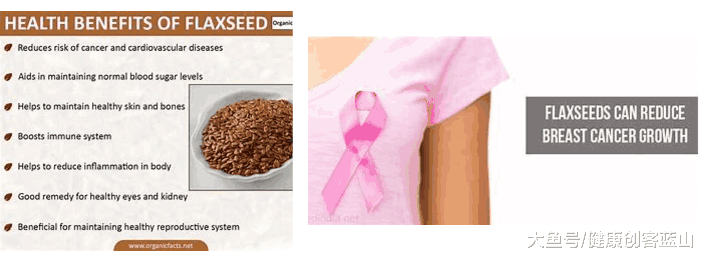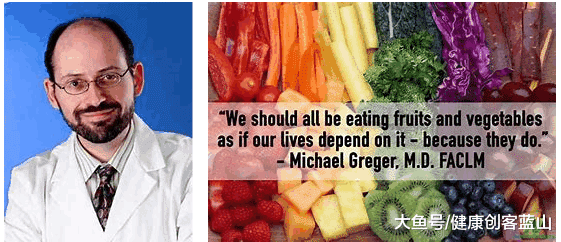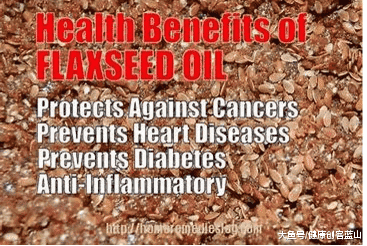多伦多大学 亚麻籽可以预防乳腺癌
Preventing Breast Cancer with Flax Seeds
Written By Michael Greger M.D. FACLM on May 26th, 2016
我以前讨论饮食木酚素在减少患乳腺癌的风险和改善乳腺癌生存期的作用,根据研究显示,患有乳腺癌的妇女吃最木酚素似乎活得更长(亚麻籽和乳腺癌生存:流行病学证据和亚麻籽和乳腺癌生存:临床证据)。
多伦多大学: 亚麻籽可以预防乳腺癌
然而,木酚素在整个植物王国中随处可见——种子、全谷类、蔬菜、水果、浆果——那么,我们怎么知道木酚素不仅仅是一种未精制植物食物的摄入的标记呢?例如,那些大量食用植物——素食主义者——的人所摄入的木酚素是杂食动物的8倍。
在皮氏培养皿中,木酚素被证明对人类乳腺癌细胞有直接的抗癌生长活性,并能防止癌细胞迁移。但直到2005年,它才被用于人体试验。多伦多大学(University of Toronto)的研究人员进行了一项随机双盲安慰剂对照临床试验(在我的视频中可以看到,亚麻籽有助于预防乳腺癌吗?)研究人员发现,亚麻似乎有潜力在短短几周内减少人类乳腺肿瘤的生长。因此,我开始向乳腺癌患者推荐亚麻籽粉。
木酚素能在一开始就帮助预防乳腺癌吗?摄入大量的木酚素会降低患乳腺癌的风险,但从总体上看,木酚素的摄入量可能只是表明植物食物摄入量高的一个指标。因此,堪萨斯大学的研究人员在一年的时间里,每天给患乳腺癌高风险的女性一茶匙亚麻籽粉,平均发现乳房癌前病变减少。
经常吃亚麻籽的妇女怎么办? 除了实验之外,没有多少女性定期吃亚麻籽来研究——直到现在。一项发表在《癌症起因与控制》(cancer Causes and Control)杂志上的研究发现,将3000名患有乳腺癌的女性与3000名没有患乳腺癌的女性相比较,食用亚麻籽(以及亚麻面包)可使患乳腺癌的风险降低20 - 30%。研究人员指出,由于亚麻籽富含木酚素,因此每天只需少量食用亚麻籽,就能达到与降低乳腺癌风险相关的木酚素摄入量。研究人员得出结论:“大多数女性似乎不吃亚麻籽,而且少量食用亚麻籽可能与降低乳腺癌风险有关,因此可以考虑采取干预措施,提高亚麻籽消费的流行程度。”
Michael Greger, M.D. FACLM, is a physician, author
最新的综述总结了亚麻与降低乳腺癌风险、改善心理健康和降低乳腺癌患者死亡率之间的关系。我所知道的关于亚麻和大脑健康的唯一另一项研究是对100种常用药物和补充剂的研究,这些药物和补充剂对老年人的认知能力有帮助。
亚麻籽还能帮助预防和治疗乳腺癌吗?有一种叫做白细胞介素-1的炎症分子,它可以帮助肿瘤生长、生长和侵袭。因此,我们的身体会产生一种interkeukin-1受体拮抗剂,与IL-1受体结合并阻断IL-1的作用。这种保护性抑制剂的活性可以通过服用他莫昔芬或食用亚麻籽来提高。在绝经前妇女中,白细胞介素-1的促炎谱可以通过饮食中添加少量亚麻粉来抵消。
一个月的亚麻可以使抗炎抑制剂水平提高50%以上,甚至比药物更好。
是的,摘除卵巢可以减少60%的乳腺癌风险,但代价是严重的副作用。它莫西芬可以使乳腺癌发病率降低40%以上,但也可能引起其他严重的副作用,如子宫癌和血块。这就是为什么需要制定一些毒性更小(甚至更安全)的乳腺癌预防策略,比如改变饮食习惯。这些亚麻籽中的木酚类植物雌激素可能是一条成功的途径,因为数据显示,它们可以降低乳腺癌的风险,提高整体存活率。
亚麻籽-预防癌症和心脏病、抗炎
木酚素不是预防乳腺癌的灵丹妙药——我们不能只是在熏肉奶酪汉堡上撒些亚麻——但作为健康饮食和生活方式的一部分,它们可能有助于降低普通人群患乳腺癌的风险。
亚麻籽还可以帮助男性对抗激素介导的癌症。看看亚麻籽和前列腺癌是亚麻籽,脂肪限制,还是两者兼而有之?
Preventing Breast Cancer with Flax Seeds
Written By Michael Greger M.D. FACLM on May 26th, 2016
I’ve previously discussed the role of dietary lignans in the reduction of breast cancer risk and improvement in breast cancer survival, based on studies that showed that women with breast cancer who ate the most lignans appeared to live longer (Flaxseeds & Breast Cancer Survival: Epidemiological Evidence and Flaxseeds & Breast Cancer Survival: Clinical Evidence). However, lignans are found throughout the plant kingdom—in seeds, whole grains, vegetables, fruits, berries—so, how do we know lignans aren’t merely a marker for the intake of unrefined plant foods? For example, those who eat lots of plants—vegetarians—have about eight times the lignan intake compared to omnivores.
In a petri dish, lignans have been shown to both have direct anticancer growth activity against human breast cancer cells and to prevent cancer cell migration. But it wasn’t until 2005 that it was put to the test in people. Researchers from the University of Toronto conducted a randomized double-blind placebo-controlled clinical trial (as seen in my video, Can Flax Seeds Help Prevent Breast Cancer?) of flaxseeds, the world’s most concentrated source of lignans, in breast cancer patients. The researchers found that flax appears to have the potential to reduce human breast tumor growth in just a matter of weeks. Therefore, I started recommending ground flax seeds to breast cancer patients.
Can lignans also help prevent breast cancer in the first place? High lignan intake is associated with reduced breast cancer risk, but again lignan intake may just be saying an indicator of high plant food intake in general. So, researchers from the University of Kansas gave women at high risk for breast cancer a teaspoon of ground flaxseeds a day for a year, and found on average a drop in precancerous changes in the breast.
What about women who regularly eat flax seeds? Outside of an experimental setting, there just weren’t a lot of women eating flax seeds regularly to study—until now. Matching 3,000 women with breast cancer to 3,000 women without, a study published in Cancer Causes and Control found that consumption of flaxseed (and of flax bread) was associated with a 20–30 percent reduction in breast cancer risk. The researchers note that, as flaxseeds are packed with lignans, only a small daily serving of flaxseed is required to attain the level of lignan intake associated with a reduction in breast cancer risk. Researchers concluded: “As it appears that most women do not consume flaxseed and that small amounts may be associated with reduced breast cancer risk, interventions to increase the prevalence of flaxseed consumption might be considered.”
The latest review summarizes the association between flax and decreased risk of breast cancer, better mental health, and lower mortality among breast cancer patients. The only other study of flax and brain health I’m aware of was an exploration of 100 commonly used drugs and supplements on cognition in older adults, which found that flax is one of the few things that appears to help.
How else may flaxseeds aid in preventing and treating breast cancer? There’s an inflammatory molecule called interleukin-1, which may help tumors feed, grow, and invade. Our bodies therefore produce an interkeukin-1 receptor antagonist, binding to the IL-1 receptor and blocking the action of IL-1. The activity of this protective inhibitor can be boosted with the drug tamoxifen—or by eating flax seed. In premenopausal women, the proinflammatory profile of interleukin-1 can be counteracted by a dietary addition of a few spoonfuls of ground flax. One month of flax may be able to increase the anti-inflammatory inhibitor levels by over 50 percent, better even than the drug.
Yes, having one’s ovaries removed may reduce breast cancer risk as much as 60 percent, but at the cost of severe side effects. The drug tamoxifen may reduce the incidence of breast cancer by more than 40 percent, but may induce other severe side effects such as uterine cancer and blood clots. That’s why less toxic (even safe!) breast cancer preventive strategies, such as dietary modifications, need to be developed. These lignan phytoestrogens in flaxseeds may be one successful route given the data showing reduced breast cancer risk and improved overall survival.
Lignans are not a magic bullet to prevent breast cancer—we can’t just sprinkle some flax on our bacon cheeseburger—but as a part of a healthy diet and life-style, they might help to reduce breast cancer risk in the general population.
Flaxseeds may also help fight hormone-mediated cancers in men. See Flaxseed vs. Prostate Cancer and Was It the Flaxseed, Fat Restriction, or Both?
https://nutritionfacts.org/2016/05/26/preventing-breast-cancer-with-flax-seeds/



.png)